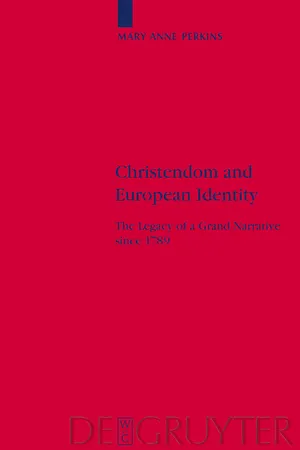
Christendom and European Identity
The Legacy of a Grand Narrative since 1789
- 397 pages
- English
- PDF
- Available on iOS & Android
About this book
This book critically explores the idea of Europe since the French Revolution from the perspective of intellectual history. It traces the dominant and recurring theme of Europe-as-Christendom in discourse concerning the relationship of religion, politics and society, in historiography and hermeneutics, and in theories and constructions of identity and 'otherness'. It examines the evolution of a grand narrative by which European elites have sought to define European and national identity. This narrative, the author argues, maintains the existence of common historical and intellectual roots, common values, culture and religion. The book explores its powerful legacy in the positive creation of a sense of European unity, the ways in which it has been exploited for ideological purposes, and its impact on non-Christian communities within Europe.
Frequently asked questions
- Essential is ideal for learners and professionals who enjoy exploring a wide range of subjects. Access the Essential Library with 800,000+ trusted titles and best-sellers across business, personal growth, and the humanities. Includes unlimited reading time and Standard Read Aloud voice.
- Complete: Perfect for advanced learners and researchers needing full, unrestricted access. Unlock 1.4M+ books across hundreds of subjects, including academic and specialized titles. The Complete Plan also includes advanced features like Premium Read Aloud and Research Assistant.
Please note we cannot support devices running on iOS 13 and Android 7 or earlier. Learn more about using the app.
Information
Table of contents
- Acknowledgments
- Explanatory Notes on the Text
- Introduction
- Part 1: Old and New models of Sovereignty in Europe-as-Christendom
- Chapter 1. Christendom revived: Catholic and Romantic visions of Europe
- Chapter 2. Protestantism and Anglicanism in the 19th century: The challenge to Europe-as-Christendom
- Chapter 3. Liberalism and popular sovereignty: Christendom reconstructed
- Chapter 4. The significance of the Christendom narrative in 20th-century Christian Democracy and Christian Socialism
- Chapter 5. Federalism, Confederation and the new Christendom: 19th-century models of European unity
- Chapter 6. The Christendom legacy in 20th-century federalism
- Part 2: ‘Christendom’ as the Realm of Universal History
- Chapter 7. The appropriation of Universal History
- Chapter 8. Christendom as a hermeneutical realm
- Chapter 9. The Christendom legacy in 20th-century histories
- Chapter 10. From Universal History to the history of Europe as Idea
- Part 3: The ‘Spirit of Europe’ and its ‘Others’
- Chapter 11. Nationalism, Europeanism and the grand narrative
- Chapter 12. Pan-Germanism and Prussian militarism: a remodelled narrative
- Chapter 13. Europe-as-Christendom and the Jews of the European Diaspora
- Chapter 14. From ‘barbarians without’ to ‘barbarians within’: Christendom and the idea of civilization in the ‘long’ 19th century
- Chapter 15. Islam and Christendom
- Chapter 16. The question of Russia
- Chapter 17. The 20th century: barbarism and civilization reassessed
- Chapter 18. Christendom as the ‘spirit of Europe’
- Conclusion
- Bibliography
- Index